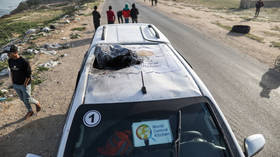Russian legislators under fire for proposed abortion restrictions

A push by the Russian government to raise childbirth statistics has driven lawmakers to propose a bill limiting a pregnant woman's options for abortion. Critics oppose the initiative saying it is wrong and an ineffective way to deal with the problem.
When she heard she was pregnant again, Elena Semikhina had already been through two caesarian sections and had two healthy sons to make her life complete. Along with her diabetes, the third pregnancy was a huge risk. Now, though, she cannot imagine life without her Sasha.“I look at my little miracle and cannot even imagine that once I had thoughts about getting rid of him,” she said. “I have never regretted my decision.”Elena was able to make her choice freely. Had she wanted a termination, nothing would have stood in her way. Abortion in Russia is available on request up to 12 weeks into the pregnancy, and is permitted at any stage if the pregnancy puts the mother’s life in danger. The proposed legislation would end free abortions at state clinics and make women wait for a week before the termination to think over their decision. The “morning-after pill”, now available at any pharmacy, would also become prescription-only. “If we managed to avert at least 20 per cent of abortions annually, we would have a clear increase in birth rates instead of a demographic decline,” said Igor Beloborodov, Director of Demographic Research Institute. Tatiana Popova, a qualified psychologist working at one of Moscow’s maternity hospitals, says the stress of an unplanned pregnancy often makes women rush into a decision they might later regret.“My task is not to talk a woman out of abortion, just show her the alternatives, so that she does not end up tormenting herself later with questions like how old the baby would have been now and what he or she would have looked like,” she said. Experts say the only way forward is to give women the security needed to embark on motherhood. Single mother Olga Myasnikova found the help she was so desperate for at a Moscow charity, which now provides food for her increased family. “My husband left me when I was pregnant,” she said. “I did not have any means to feed the kids I already had, let alone raise another one.”However, opponents of the proposed legislation believe limiting a woman’s choice breaches her health rights and human rights.“My body is my business” is just one of their slogans.“History shows that banning abortions has never led to a baby boom,” one of the activists told RT. When the Soviet Union outlawed abortions in 1936, the result was an enormous increase in the maternal death rate. That is what doctors fear most – that restrictions on legal abortions will only push women to find risky backstreet alternatives, even if it threatens their health and life.Some believe that restricting abortions could lead to more women abandoning their newborn children. “In Russia 40 per cent of women decide against pregnancy,” said Galina Dikke from the Department of Reproductive Medicine and Surgery. “If a woman is determined not to have children, she will not, and that includes simply abandoning them.”Abandoned children did not choose to come into this world and be deprived of their basic right for parental love. One day they might find someone to call their family. However, the issue is whether restricting abortions will lead to more children abandoned after being born against their mothers’ will.














